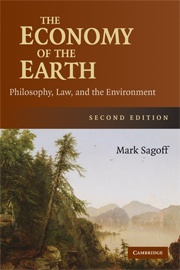Book contents
- Frontmatter
- Contents
- Acknowledgments
- 1 Introduction
- 2 At the Shrine of Our Lady of Fatima or Why Political Questions Are Not All Economic
- 3 The Allocation and Distribution of Resources
- 4 Values and Preferences
- 5 Can We Put a Price on Nature's Services?
- 6 Do We Consume Too Much?
- 7 Is an Environmental Ethic Compatible with Biological Science?
- 8 Settling America or the Concept of Place in Environmental Ethics
- 9 Natural and National History
- 10 Environmentalism: Death and Resurrection
- Notes
- Index
7 - Is an Environmental Ethic Compatible with Biological Science?
Published online by Cambridge University Press: 05 June 2012
- Frontmatter
- Contents
- Acknowledgments
- 1 Introduction
- 2 At the Shrine of Our Lady of Fatima or Why Political Questions Are Not All Economic
- 3 The Allocation and Distribution of Resources
- 4 Values and Preferences
- 5 Can We Put a Price on Nature's Services?
- 6 Do We Consume Too Much?
- 7 Is an Environmental Ethic Compatible with Biological Science?
- 8 Settling America or the Concept of Place in Environmental Ethics
- 9 Natural and National History
- 10 Environmentalism: Death and Resurrection
- Notes
- Index
Summary
In 2005 the discovery of an ivory-billed woodpecker (Campephilus principalis) caused a national celebration. Donald Kennedy, the editor of Science magazine, spoke for millions of others when he testified in an editorial to “the personal excitement and pleasure this discovery has brought me.” Kennedy acknowledged that “some will say, ‘It's only a bird.’” Why is the survival of this bird or any species – especially a species with no economic use – important? The ivory-billed woodpecker is a product of evolution, that is, random mutation and natural selection. It exists as a result of accident and not of design or purpose. Why does it cast a spell over us?
Scientists had declared the ivory-billed woodpecker extinct. A prominent ecologist had written five years earlier, “Its presence today in the sterile, industrial forestlands of the South, however wonderful a thought, would be as out of place as a buckskin-clad settler with a musket in the streets of modern-day Atlanta.” When the woodpecker reappeared, the same ecologist wrote that “those not under the spell of this charismatic species might well wonder what all the fuss is about.”
What is all the fuss about? If evolution proceeds without purpose, meaning, design, or direction – if the existence of this or any species is simply an accident that just as well might not have occurred – why should we care about this bird or about any wild creature except insofar as we can find a use for it?
- Type
- Chapter
- Information
- The Economy of the EarthPhilosophy, Law, and the Environment, pp. 137 - 156Publisher: Cambridge University PressPrint publication year: 2007



